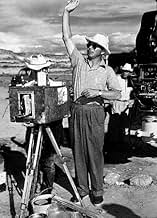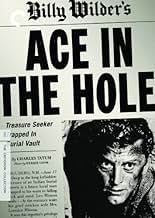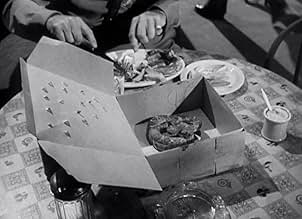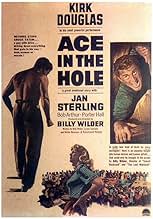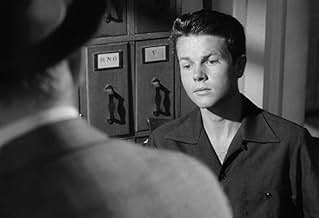AVALIAÇÃO DA IMDb
8,1/10
41 mil
SUA AVALIAÇÃO
Um ex-jornalista frustrado que agora trabalha para um jornal de Albuquerque aproveita uma história sobre um homem preso em uma caverna para reavivar sua carreira, mas a situação rapidamente ... Ler tudoUm ex-jornalista frustrado que agora trabalha para um jornal de Albuquerque aproveita uma história sobre um homem preso em uma caverna para reavivar sua carreira, mas a situação rapidamente se transforma em um circo descontrolado.Um ex-jornalista frustrado que agora trabalha para um jornal de Albuquerque aproveita uma história sobre um homem preso em uma caverna para reavivar sua carreira, mas a situação rapidamente se transforma em um circo descontrolado.
- Direção
- Roteiristas
- Artistas
- Indicado a 1 Oscar
- 5 vitórias e 3 indicações no total
Robert Arthur
- Herbie Cook
- (as Bob Arthur)
Roy Regnier
- Nagel - New York Editor (replaced by Richard Gaines)
- (cenas deletadas)
Oscar Belinda
- Barker
- (não creditado)
Avaliações em destaque
Saw this films years ago and it's still gripping.Mr.Wilder seldom did films that gripped the human condition like this one.After this movie flopped he stuck to screen adaptions of stage hits through most of the fifties.Both director and star,Kirk Douglas really delivered a stinging expose of media hype and manipulation of the newspaper business.Herein,burned out reporter Douglas chances on a man trapped in a cave and ruthlessly exploits it for his own gain.There's no softness here,even the leading lady (played wonderfully by Jan Sterling)is as hard as Douglas.The scenes of all the gawkers showing up,complete with carnival,are outright creepy.There's even a cheesy country western singer plunking a guitar and singing about poor Leo,(the trapped man.) The only sympathetic person is poor Leo's mom who continually prays for his release.Definitely a film for lovers of great movie drama.
Of the many movies I viewed in the early 50's, so many ,like now, were here today, forgotten tomorrow. However some movies that became memorable and that were able to make a dramatic impact on this young guy include, Duel in the Sun and Gone with the Wind. Strangely enough, Ace in the Hole is the most memorable of all movies viewed. It is one that invades the mind and leaves one sad.
Few films I remember as vividly as this dark movie, the images linger to haunt me still. 'Why?' one might ask 'would a sombre movie like this made over 50 years ago remain so memorable, when so many others have vanished. Was it the surreal inhumanity of the plot, the repugnant newsman devoid of ethics, the exploitation of the trapped victim, the purposeful prolonging of the victim's entrapment to create a media frenzy, the ultimate commercial creation of an 'event' style attraction complete with a circus like atmosphere surrounding the cave while the victim remained entrapped and close to death.'
Supposedly based on a real incident, it's a tough movie to watch and more so if one is prepared to accept the premise that such inhumanity displayed in the movie has an element of truth.
I echo the desires of others to have the availability of this movie on VHS or DVD. In the interim my memory will continue to keep the images intact. See it if you can.
Few films I remember as vividly as this dark movie, the images linger to haunt me still. 'Why?' one might ask 'would a sombre movie like this made over 50 years ago remain so memorable, when so many others have vanished. Was it the surreal inhumanity of the plot, the repugnant newsman devoid of ethics, the exploitation of the trapped victim, the purposeful prolonging of the victim's entrapment to create a media frenzy, the ultimate commercial creation of an 'event' style attraction complete with a circus like atmosphere surrounding the cave while the victim remained entrapped and close to death.'
Supposedly based on a real incident, it's a tough movie to watch and more so if one is prepared to accept the premise that such inhumanity displayed in the movie has an element of truth.
I echo the desires of others to have the availability of this movie on VHS or DVD. In the interim my memory will continue to keep the images intact. See it if you can.
This is a movie I have loved since the first time I saw it as a child. Kirk Douglas plays the lead role in "The Big Carnival", or "Ace in the Hole" as it was originally titled. As down and out former ace newspaper reporter Chuck Tatum, he finds himself broke in the southwest and manages to talk himself into a reporting job with a small town newspaper. He and a cub photographer are sent to cover a snake hunt and on the way they come across a more interesting story. A man hunting Navaho artifacts got caught in a cave in.
Tatum, after visiting the man, Leo Minoso in the cave, has visions of Floyd Collins and a Pulitzer prize dancing in his head. Through blackmail and manipulation of the story, Tatum sells his soul and his journalistic ethics in his quest for a chance at the big time again.
This movie was ahead of it's time in estimating how low the media would go to sell a story. Tatum leads the carnival of onlookers, vendors and other reporters wanting a piece of the story until the inevitable tragic ending occurs. He realizes too late how he has turned a simple event into a tragedy and become part of the story instead of a reporter. Kirk Douglas turns in a powerful performance.
Tatum, after visiting the man, Leo Minoso in the cave, has visions of Floyd Collins and a Pulitzer prize dancing in his head. Through blackmail and manipulation of the story, Tatum sells his soul and his journalistic ethics in his quest for a chance at the big time again.
This movie was ahead of it's time in estimating how low the media would go to sell a story. Tatum leads the carnival of onlookers, vendors and other reporters wanting a piece of the story until the inevitable tragic ending occurs. He realizes too late how he has turned a simple event into a tragedy and become part of the story instead of a reporter. Kirk Douglas turns in a powerful performance.
10zinkster
One of Billy Wilder's great movies, with a superb acting job by Kirk Douglas as the cynical, glory-seeking and even desperate reporter whose only goal is get back in the limelight by regaining his former big-city news desk job.
The idea of such a newspaper reporter manipulating events to stretch out a story at the expense of and disregard for the victim still seems nearly inhuman, but Douglas' performance makes it instantly believable. The story scenario in which locals, then passers-by and finally distant tourists gravitate to and then make a festival or circus out of the event (the film was also released under the title "The Big Carnival") is supported by the real events on which the story was most likely based: the West VA mine disaster in 1925 that trapped miner Floyd Collins and was reported for 17 days, much as in the film, by local newspaperman Skeets Miller, who crawled into the mineshaft for face-to-face interviews with the trapped and doomed Collins.
This movie fits nicely into the Film Noir genre, although it takes place largely under the hot, harsh glare of the Arizona sun, highlighting the sweat and grime visible on the characters' skin and creating a visual metaphor for the sorry state of their souls. I wonder if Henri-Georges Clouzot saw this film before he began filming "The Wages of Fear," because the visually pervasive atmosphere of sweat and filth and opportunism are equally present in both.
The idea of such a newspaper reporter manipulating events to stretch out a story at the expense of and disregard for the victim still seems nearly inhuman, but Douglas' performance makes it instantly believable. The story scenario in which locals, then passers-by and finally distant tourists gravitate to and then make a festival or circus out of the event (the film was also released under the title "The Big Carnival") is supported by the real events on which the story was most likely based: the West VA mine disaster in 1925 that trapped miner Floyd Collins and was reported for 17 days, much as in the film, by local newspaperman Skeets Miller, who crawled into the mineshaft for face-to-face interviews with the trapped and doomed Collins.
This movie fits nicely into the Film Noir genre, although it takes place largely under the hot, harsh glare of the Arizona sun, highlighting the sweat and grime visible on the characters' skin and creating a visual metaphor for the sorry state of their souls. I wonder if Henri-Georges Clouzot saw this film before he began filming "The Wages of Fear," because the visually pervasive atmosphere of sweat and filth and opportunism are equally present in both.
A powerful toasting of the media of the day. Imagine what this would have been like in the age of television. Kirk Douglas plays a self-centered heel, and does so very well. I also liked Jan Sterling as Lorraine. It's true that there is no really sympathetic character in this film, except maybe Leo, the man trapped in the cave. Someone wrote that he too, wasn't a sympathetic character, because he was trapped while collecting Indian artifacts for sale, but I don't think that would have bothered anyone in 1951. The tone of the film throughout was one of total cynicism, that seems a bit out of place for the times. Maybe that's why this movie was not a commercial success. It fits much better now, though, since everyone has seen the media behaving in such disgraceful fashion. However, that may rob it of some of its (probably intended) shock value. Grade: A
Você sabia?
- CuriosidadesAfter the film was released, it got bad reviews and lost money. The studio, without Billy Wilder's permission, changed the title to "The Big Carnival" to increase the box office take of the film. It didn't work. On top of that, Wilder's next picture, O Inferno Nº 17 (1953), was a hit and he expected a share of the picture's profits. Paramount's accountants told him that since this picture lost money, the money it lost would be subtracted from the profits of "Stalag 17".
- Erros de gravaçãoWhen Lorraine and Chuck are talking out in front of Minosa's store by the gas pumps, reflections of the crew moving around behind the camera can be seen in the store windows.
- Citações
Charles Tatum: Bad news sells best. Cause good news is no news.
- ConexõesFeatured in AFI Life Achievement Award: A Tribute to Billy Wilder (1986)
- Trilhas sonorasThe Hut-Sut Song
(uncredited)
Written by Leo Killion, Ted McMichael and Jack Owens
Sung by Richard Benedict and Kirk Douglas
Principais escolhas
Faça login para avaliar e ver a lista de recomendações personalizadas
Detalhes
- Data de lançamento
- País de origem
- Idiomas
- Também conhecido como
- A Montanha dos Sete Abutres
- Locações de filme
- Laguna Pueblo, Novo México, EUA(church exteriors)
- Empresa de produção
- Consulte mais créditos da empresa na IMDbPro
Bilheteria
- Orçamento
- US$ 1.800.000 (estimativa)
- Faturamento bruto mundial
- US$ 2.300.087
- Tempo de duração
- 1 h 51 min(111 min)
- Cor
- Proporção
- 1.37 : 1
Contribua para esta página
Sugerir uma alteração ou adicionar conteúdo ausente


